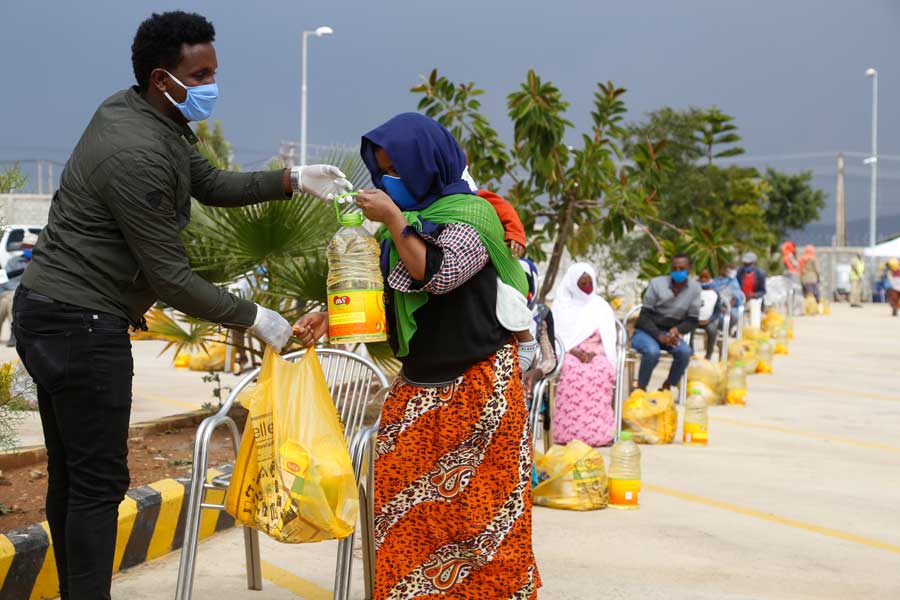
Radar | May 14,2022
May 8 , 2021
By Eden Sahle
A couple of weeks back, a family friend visited a construction materials shop in Addis Abeba. He was looking to buy gypsum for his house’s repair.
“Do you need the gypsum to make injera[flatbread] or for construction purposes as it comes with a different texture?” the seller, unembarrassed and bluntly asked.
Laughing at the question, the buyer held that he needed it for construction purposes. He bought the material and left the shop without complaint. Instead of reporting it to the authorities, he used his experience as a hilarious anecdote.
This is not a laughing matter but a crime against consumer protection. We consume in good faith because we believe that suppliers would provide goods and services ethically. From local butter, edible oils and honey to various flours, the problem of substances being mixed in with food items has become a major public health problem. Sadly enough, the public has become an accomplice by failing to report a crime that harms it.
Eating such contaminated foods can lead to several severe and permanent health problems. It has gotten to the point where medical practitioners warn that it is common to treat patients who come to emergency rooms with a clogged gastrointestinal tract caused by ingesting gypsum with injera or bread. Children are at more risk as their yet underdeveloped organs are particularly vulnerable to such damaging substances.
This is just one of many tales of crimes that are harder to address partly due to a public that cannot be bothered to report offences. In this case, the very thing that has continued to threaten public health could have been stemmed to an extent by reporting the person selling gypsum for such purposes instead of laughing it out later with friends.
Community-based approaches to crime prevention, including social development strategies, can more greatly impact deterring crimes than law enforcement alone. Implementing community-oriented policing to prevent crime and strengthen cooperation between the police and the citizens they serve is essential. Such appropriate social measures and interventions seek to reduce and eventually eliminate the causes of crime.
Certainly, crimes are stubborn occurrences in every society around the world. One of the main compounding factors is poverty. In the case of gypsum being used to make injera, it could have been presented by improving packaging and putting in place a formal and rational supply chain. Suppliers that are allowing harmful products to pass could be more easily identified by authorities. Of course, such a supply chain and packaging, especially to injera, would require a public with higher living standards to sustain.
No less critical to addressing such crimes is having a community that trusts police and the justice system. Too often, the latter are seen as instruments for protecting the rich and powerful from the weak and poor. It is not unheard of to hear individuals lament about being inconvenienced and abused because they took the bold step of reporting crimes.
It is not easy to address crime in any society where the poor and the rich live side by side. It requires fixing the justice system, addressing abject poverty and engaging communities. It is no easy task but necessary all the matter in protecting all of us from harm. In this case, businesses that mix toxic substances with foods can only be combated effectively with the justice system, law enforcement personnel and the public joining hands to put an end to it. In the absence of this, offenders will be motivated to continue poisoning the public as a suitable business opportunity.
PUBLISHED ON
May 08,2021 [ VOL
22 , NO
1097]

Radar | May 14,2022

Radar | Nov 27,2018

Editorial | Dec 19,2020

Viewpoints | Mar 23,2019

Radar | May 07,2022

Commentaries | Sep 26,2021

Radar | Sep 19,2020

Fortune News | Nov 13,2021

Radar | Jun 27,2020

Fortune News | Jun 07,2020

My Opinion | 131548 Views | Aug 14,2021

My Opinion | 127903 Views | Aug 21,2021

My Opinion | 125879 Views | Sep 10,2021

My Opinion | 123510 Views | Aug 07,2021

Dec 22 , 2024 . By TIZITA SHEWAFERAW
Charged with transforming colossal state-owned enterprises into modern and competitiv...

Aug 18 , 2024 . By AKSAH ITALO
Although predictable Yonas Zerihun's job in the ride-hailing service is not immune to...

Jul 28 , 2024 . By TIZITA SHEWAFERAW
Unhabitual, perhaps too many, Samuel Gebreyohannes, 38, used to occasionally enjoy a couple of beers at breakfast. However, he recently swit...

Jul 13 , 2024 . By AKSAH ITALO
Investors who rely on tractors, trucks, and field vehicles for commuting, transporting commodities, and f...

Jun 28 , 2025
Meseret Damtie, the assertive auditor general, has never been shy about naming names...

Jun 21 , 2025
A well-worn adage says, “Budget is not destiny, but it is direction.” Examining t...

Jun 14 , 2025
Yet again, the Horn of Africa is bracing for trouble. A region already frayed by wars...

Jun 7 , 2025
Few promises shine brighter in Addis Abeba than the pledge of a roof for every family...

Jun 29 , 2025
Addis Abeba's first rains have coincided with a sweeping rise in private school tuition, prompting the city's education...

Jun 29 , 2025 . By BEZAWIT HULUAGER
Central Bank Governor Mamo Mihretu claimed a bold reconfiguration of monetary policy...

Jun 29 , 2025 . By BEZAWIT HULUAGER
The federal government is betting on a sweeping overhaul of the driver licensing regi...

Jun 29 , 2025 . By NAHOM AYELE
Gadaa Bank has listed 1.2 million shares on the Ethiopian Securities Exchange (ESX),...